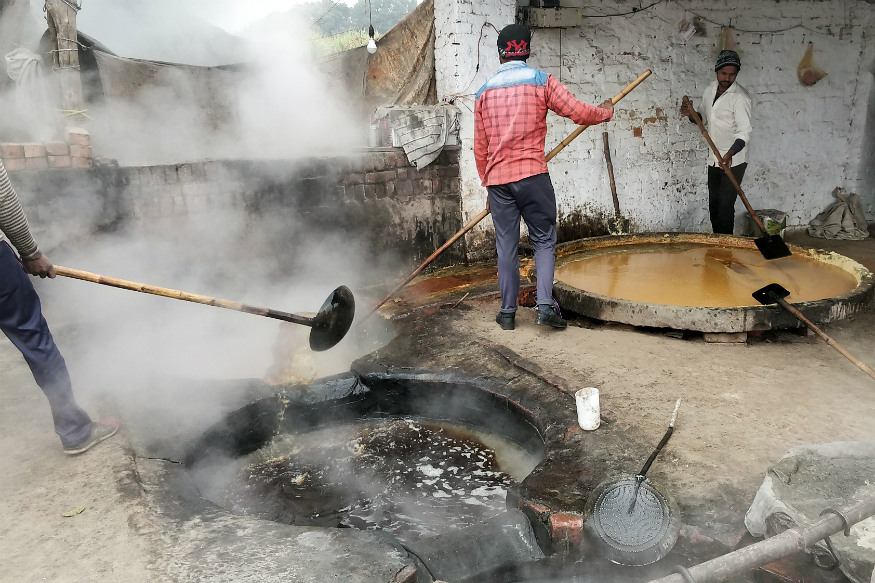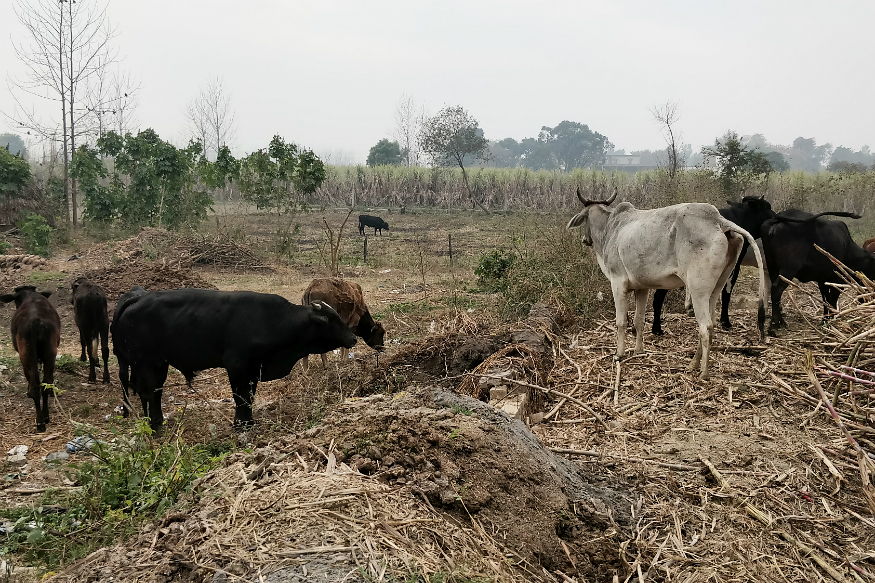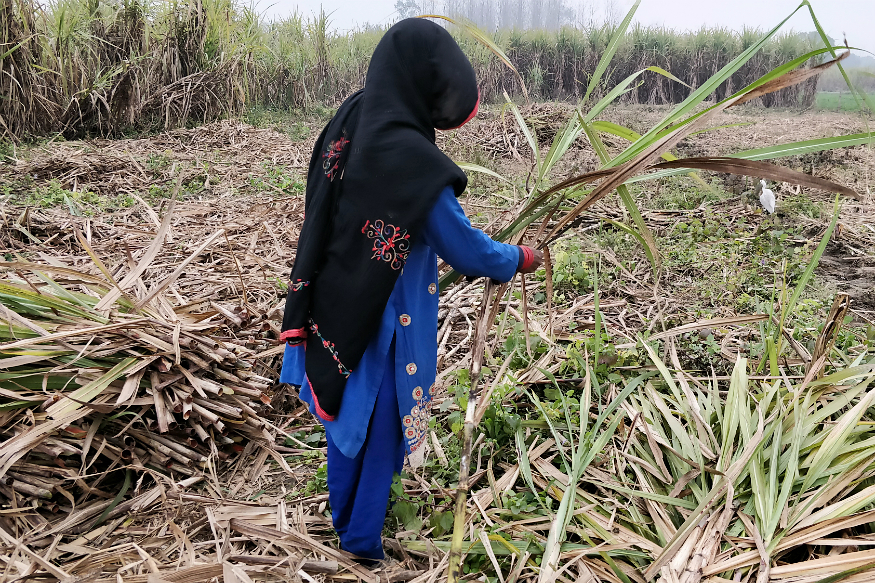
views
Shamli: The Upper Doab sugar mill in Uttar Pradesh’s Shamli district, which owes farmers Rs 200 crore as unpaid dues, made the first payment of Rs 15 crore just a day before the Union government is to announce its last budget before the general elections.
The farmers now await another payment of Rs 105 crore, to be before February 11. But has the journey to this first payment been easy? Hundreds of tired, hungry and helpless farmers in the sugarcane belt of Western UP would only shout a loud ‘No’.
With around 52 villages in Shamli, dues to the tune of Rs 220 crore, including a payment of about Rs 83 crore from the previous harvesting season, have continued to haunt the farmers who now struggle to send their children to school, pay for their textbooks or even afford a decent meal.
As the Narendra Modi government presents the last budget of its term on February 1, the farmers of Shamli have demanded that the government implement “policies announced on paper" and also ease their hardships by granting Rs 5,000 per acre compensation to the farmers who had unpaid dues from mills.
In the current 2018-19 season (October-November), sugar mills in Uttar Pradesh have bought cane worth Rs 13,749.58 crore from farmers at the state government’s average “advised" price (SAP) of around Rs 318 per quintal.
It was only after the loss faced by the BJP in the Kairana bypolls that the Centre announced a range of measures to deal with the problem, which was nothing but a case of overproduction.
India produced 32 million tonnes of sugar in 2017-18, while the demand was only 25 million tonnes. This stark imbalance in demand and supply of sugarcane saw the mills facing severe shortage of cash.
In June 2018, the Centre announced Rs 7,000-crore bailout package for the sugar industry, including allocations for maintenance of buffer stock and financial assistance for long term capacity expansion. However, this plan too fell short to meet the target.
Ankit Pawar, an engineering graduate from Delhi who had to return to join farming with his father, believes that farmers are no more an “illiterate herd" who can be swayed by fake promises.
Sitting beside a couple of trucks of sugarcane produce near his five-acre land in Bhaiswal village of the Shamli district, Ankit rues the fact that implementation of the ‘Swaminathan commission report’ is still far away from reality.
Most of the sugarcane produce that is sold at the mills is only purchased for a specific quantity and the remaining or excess produce often lands up at Kohlus or local jaggery-making units, which purchase the produce at dirt cheap rates but pay in cash and without delay.

A local jaggery-making unit.
“Our primary demands are that the government fulfil promises it made as per the budget layout. False promises will not work anymore. Why doesn’t it open more ethanol factories here in the villages which will help us earn more? There is a fixed period of 14 days within which the farmers are supposed to be paid their dues. Such deadlines need to be kept. There should be a strict implementation of law and order on those mills that violate this provision," said Ankit.
Not just Ankit, several other farmers are also demanding ethanol factories in villages as the chemical, which is produced from sugarcane, leads to the production of diesel and petrol, and is thus far more valuable than just mere sugar.
However, it is the lack of these ethanol factories that forces the farmers to suffer losses.
Vikas, another farmer in Shamli, believes that only expenses have been slapped on the farmers — whether it is the rising cost of electricity or a complete absence of subsidy for farmers.
“Our electricity bills should be excused. We have only been incurring losses and there has been a two-year delay in our payments. We have been protesting and all our sugarcane farms have dried up. There is no subsidy in our bank accounts as promised. Even the gas prices have been hiked. We are only left to die," said Vikas, a father of three who had managed to build a house with loans but is now having to fight the loan sharks.
Shamli district magistrate Akhilesh Singh had earlier met the protesting farmers and said that a feasible solution was possible in the next 20 days and that an FIR has been filed against the sugar mill.
The protest has also triggered a fight between the political leaders who were struggling for brownie points at farmer rallies. While RLD MP Tabassum Hasan targeted the BJP in the centre and the states where it is in power for ignoring the needs of farmers, BJP MLA Tejendra Nirwal blamed the mill authorities. Even RLD leader Jayant Chaudhary addressed the gathering, but most of the farmers believe that this was nothing but a “political jumla."
When the Centre’s strategy of using Rs 7,000 crore for farmers did not yield desired results, the Uttar Pradesh government in September announced Rs 4,000 crore worth of loans at subsidised rates to sugar mills to help clear the dues of farmers. However, the Upper Doab Sugar Mill was not the one that applied for the loan and hence the delay.
On a closer look, it’s not only the non-payment of dues that is affecting the sugarcane farmers. Since, the farmers have now realised that sugarcane is something that is taken for granted by the mills, most of the farmers have also started wheat cultivation, but a sudden attack of stray cattle has led to humongous losses among the farmers.

Sugarcane mandi at a village in Shamli from where produce is dispatched to a local mill.
“The biggest threat we are facing is of stray cattle destroying our crops. These stray animals are abandoned by the farmers when they don’t need them anymore. There should be some gaushalas to take care of the stray cattle," said a disgruntled farmer, who now stares at a net loss of Rs 2.5 lakh due to stray cattle attacks.
Mahendra Chaudhary, another local farmer, squarely blamed the Yogi Adityanath government for “bringing this calamity".
“Yogi ji indeed said that cows or progeny of cows should not be harmed, but the government has not made arrangements to house these stray cattle. These cows are getting killed in accidents or destroying our crops. There are no gaushalas and we now also spend on security just to keep the cattle away," said the Jaat farmer.
But often, when farmers are awaiting payments from the mills, it is also the informal sector workers who bear the brunt of financial irregularity.
Sarvari, a 45-year-old labourer working in the farms, has been waiting for her daily wages since one year as most of the farmers she worked for had not been paid by the mills.

Sarvari awaits her daily wages as farmers remain unpaid by mills.
“I earn Rs 200 per day for my work. But there has been a five-month delay in my wages and since I am a daily wage worker, I cannot even leave the work as I think at least some day the farmer will get paid and subsequently pay me," said Sarvari, who has recently been paid a mere Rs 2000 for a month’s work.
Many farmers are also of the view that the Rs 15 crore disbursed would hardly meet the needs of unpaid dues. “Mills will deduct their share and all our parchis are pending. Not even five days of expenditure would be met. There are so many farmers, only a very few will appear in the list who would benefit from this disbursal," said Mukesh Kasana, a farmer from Bhaiswal and owner of five-acre land. Kasana is still waiting for his Rs 1.5 lakh payment.
Farmers allege that sugar mills avoid their payments due to the “illegal" preparation of balance sheets wherein they show the income earned from sugar as the only source of income to pay the farmers whereas the income earned “from products and distilleries is conveniently kept aside."
DC Malik, advocate for the Kisan Union, pointed out that these mills also deduct amount of a kilo from every quintal sold by farmers as part of a redundant policy adopted during the days gone by and use it unscrupulously to generate profits worth thousands of crores.
“When sugarcane is sold to the mills, the mills deduct an amount of one kilo from every quintal of sugarcane. This practice was done when the sugarcane was brought to the mills by using horses or other manual labour. This was used to feed those animals. Now this is used to make biogas. The rate of biogas is much more than sugarcane. Then why this deduction?" questioned Malik.
He further reasoned that if a crore quintal is given in Shamli mill, then “almost one lakh kilo is deducted, which is used to make biogas and helps the mill generate a profit 25,000 crore".
“There are almost 122 sugar mills in UP and the government must see that when the sugar mills say that there is delay then such share of profits must also be given to the farmers," requests Malik as he and other farmers await the interim budget 2019 and its farmer relief measures.




















Comments
0 comment